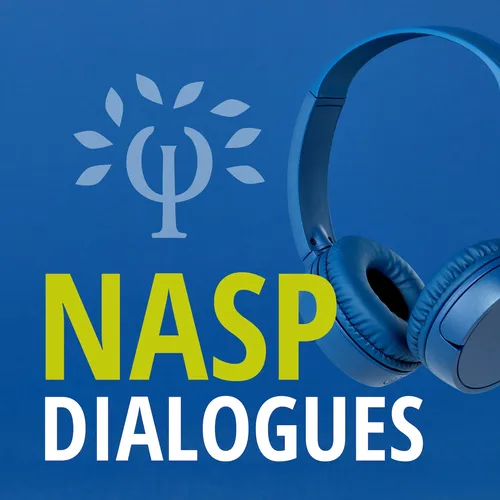
NASP Dialogues
<p>The National Association of School Psychologists (NASP) brings you essential conversations in school psychology, with episodes covering everything from mental health and crisis prevention to strategies for promoting equity and inclusion in schools. Each podcast offers expert perspectives and practical advice to help school psychologists and educators navigate the challenges of supporting student well-being.</p><p>Listen on Apple Podcasts for insights you can use to stay informed and enhance your professional practice.</p><p><strong>NASP Members:</strong> Be sure to visit <a href='https://www.nasponline.org/podcasts'>nasponline.org/podcasts</a> for exclusive, members-only podcasts available only on our website.</p>
- Update frequency
- every 9 days
- Average duration
- 33 minutes
- Episodes
- 2331
- Years Active
- 2015 - 2025

Dispelling Myths: The Affordable Care Act and School Psychologists

Meta-Analysis of Mindfulness-Based Interventions for Youth and Caregivers

Peers Promoting School Success: Protection Against Bullying

Peers Promoting School Success: Protection Against Bullying
Schools can help create a protective peer ecology in which all students are socially successful, involved with reducing bullying, and buffered from the negative effects of bullying. Participants dis…

National Center on Intensive Intervention (NCII): Data-Driven Tertiary Services
T. Chris Riley-Tillman disccusses the new National Center on Intensive Intervention, which was developed to extend the work of the National Center for RTI to students who do not respond to Tier 1 or …

Making Technology Work for School Psychologists: Applications for Success

Peers Promoting School Success: Protection Against Bullying

Training ELL Parents to Promote Social-Emotional Resiliency from Home

Peers Promoting School Success: Protection Against Bullying

NASP Dialogues: NASP's 2015 School Psychologist of the Year

Universal Screening to Inform Interventions for Behavioral and Emotional Concerns

Through a New Lens: Transforming EBD Identification Through Culturally Responsive Approaches

Dispelling Myths: The Affordable Care Act and School Psychologists

NASP Dialogues: NASP's 2015 Lifetime Achievement Award

Through a New Lens: Transforming EBD Identification Through Culturally Responsive Approaches
Students of color are disproportionally identified for special education under the category of emeotional disturbance. This session discusses how school psychologists can make disability determinatio…

Making Technology Work for School Psychologists: Applications for Success
This session reviews numerous apps for smartphones, Internet services, and various Internet sites, and discusses how to use them in an ethical and secure manner to increase practice knowledge and eff…

Secrets About School Safety
School safety expert Dewey Cornell discusses the need for school psychologists to share the seemingly secret evidence that schools are much safer than commonly believed and that school violence, rang…

National Center on Intensive Intervention (NCII): Data-Driven Tertiary Services
T. Chris Riley-Tillman disccusses the new National Center on Intensive Intervention, which was developed to extend the work of the National Center for RTI to students who do not respond to Tier 1 or …

Born Brave Experiences Study: Fostering Youth Empowerment
This session dicusses the experiences of participants of the Born brave Bus Tour along with mental health help-seeking preferences (i.e., online, phone, or face-to-face).

Preventing Dropout Through Transition Support for High Risk Youth
Youth transitioning from restrictive placements to traditional school settings present with behavioral and educational challenges that often result in school dropout or failure. Alex Trout discusses …